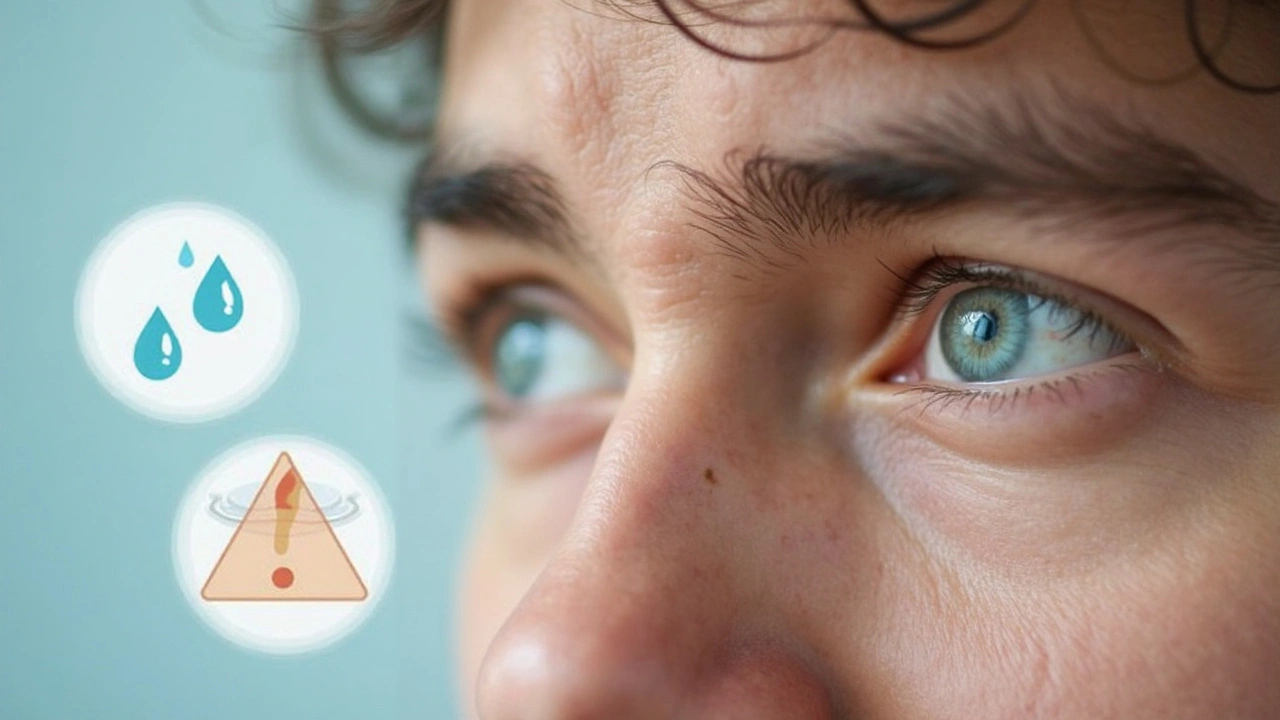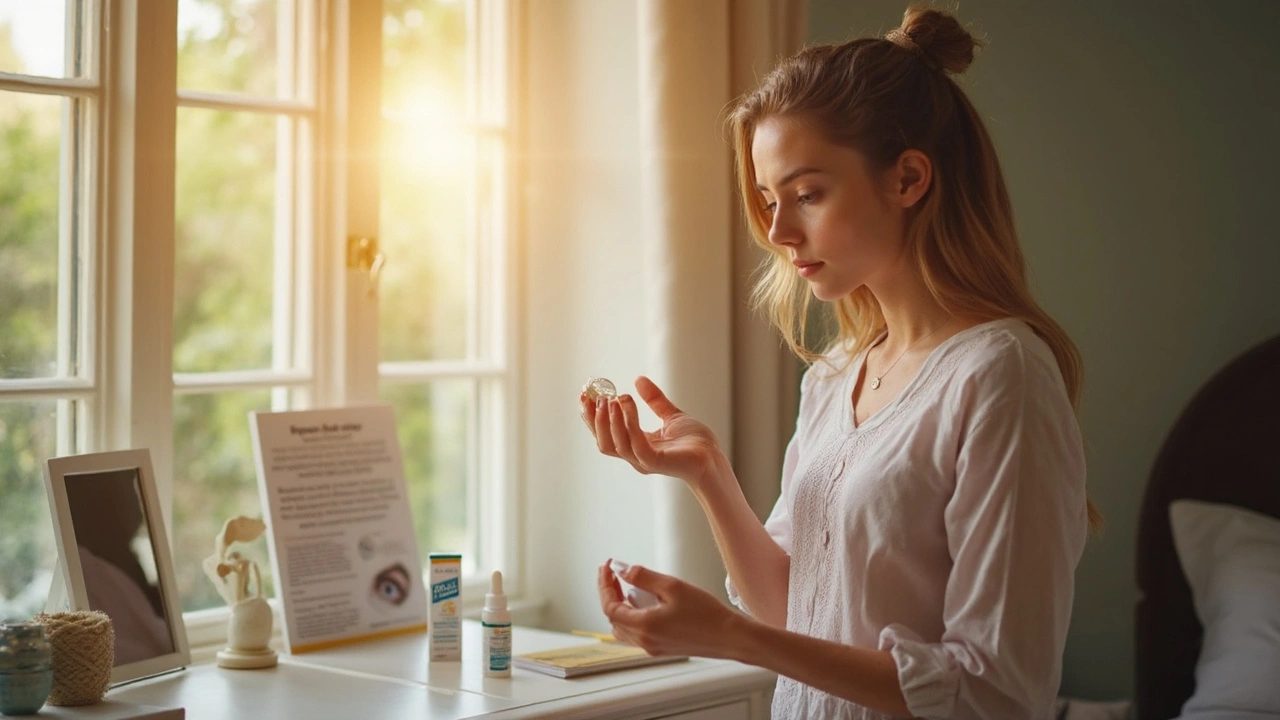Pop in your contacts and start up isotretinoin, and suddenly your eyes are drier than a desert. That’s not just bad luck—this acne medication is well-known for messing with your tear production and making contact lens wear rough.
If you notice lenses feeling gritty, slipping around, or just plain uncomfortable, you’re not imagining things. Isotretinoin shrinks your oil glands, and those same glands make the stuff that keeps eyes moist and blinking smooth. Dryer eyes plus contacts can mean everything from redness to blurriness and way more frequent eye drops.
So, what do you do if you need clear vision and clear skin? Don’t toss your lenses in the trash just yet. There are smart ways to handle these changes and keep your eyes happy while you’re on this treatment.
- Why Isotretinoin Affects Eyes
- Common Problems with Contacts During Treatment
- How to Make Contacts More Comfortable
- What to Watch Out for and When to Stop
- Tips for Safer Contact Lens Use on Isotretinoin
Why Isotretinoin Affects Eyes
So, what's the deal with isotretinoin and dry, irritated eyes? It all comes down to those tiny glands along your eyelids, called meibomian glands. These glands pump out oil that mixes with your tears, keeping your eyes from drying out. Isotretinoin actually shrinks those glands and cuts down on the oil they make. With less oil, tears evaporate faster and your eyes dry up much quicker.
This isn't just some rare side effect. According to actual patient studies, more than half of people on isotretinoin notice dry eyes or eye discomfort, especially folks who wear contact lenses. It's so common that many dermatologists warn people about it before they even start the medicine.
| Possible Eye Changes | How Common? |
|---|---|
| Dry eyes | 50%-65% |
| Red, bloodshot eyes | 30%-40% |
| Contact lens discomfort | up to 50% |
Less oil isn’t the only problem. Isotretinoin can also mess with the mucous layer of your tears. That’s another reason why your eyes can feel scratchy or like there’s grit stuck in them. Plus, with less moisture, contact lenses can start to feel like sandpaper, especially after a few hours.
Bottom line? Your eyes rely on a pretty delicate balance to keep things comfortable. Isotretinoin throws off that balance, so even if you never had a problem with your lenses before, you might start noticing issues soon after you start the medication.
Common Problems with Contacts During Treatment
If you’re wearing contacts while on isotretinoin, get ready for a few new curveballs. This medication dries out your eyes by shrinking meibomian glands—those are the tiny glands that normally keep your tears from evaporating too fast. And since contact lenses already block some oxygen to your eyes, things get even trickier.
Here’s what people usually run into:
- Dryness and Irritation: Your eyes may start to feel scratchy or itchy pretty much every day, even if you never had issues before.
- Redness: Constant dryness means more redness, which can look and feel annoying, especially with long wear times.
- Blurry Vision: When your eyes don’t make enough tears, your contacts might not ‘sit’ right, sometimes causing hazy or blurry vision after just a few hours.
- Lens Discomfort: Lenses might actually start sticking to your eyeball or move around more than usual—hardly pleasant.
- Frequent Need for Eye Drops: People on isotretinoin often find themselves reaching for artificial tears way more than usual—sometimes five or more times a day.
Here’s one way to look at it. A study published in 2023 found that about 50% of contact lens users taking isotretinoin had to switch to glasses at least temporarily because they just couldn’t tolerate the dryness.
| Problem | How Common |
|---|---|
| Dryness/Irritation | Very common (seen in 6 out of 10 users) |
| Redness | Frequent (about 4 out of 10 users) |
| Blurred vision | Moderate (2-3 out of 10 users) |
One more thing—occasionally, people can develop more serious issues like corneal ulcers or infections, just because their eyes are so dry and vulnerable. So don’t ignore new symptoms thinking it’s just normal side effects. When in doubt, check in with your eye doctor.

How to Make Contacts More Comfortable
Wearing contacts on isotretinoin doesn’t have to mean sore, scratchy eyes all day. There are a bunch of things you can do to dodge the worst of the dry eyes and keep your contact lenses feeling decent.
First up, get picky about your contacts. Daily disposable lenses are usually better because you’re always putting in a fresh, moist lens. They’re thinner and less likely to trap gunk or dry out as fast as monthly lenses. If you usually wear your lenses all day, try cutting back to just a few hours at a time or alternate with glasses. Your eyes will thank you for the break.
Don’t forget about rewetting drops. Grab some preservative-free artificial tears whenever your eyes start feeling dry or irritated. Steer clear of drops that say ‘get the red out’ since those can make things worse. And always check that any drops you use are safe for contact lens wearers.
Here’s a simple cheat sheet to keep eye care easier while on this acne medication:
- Use daily disposable lenses if possible.
- Keep contacts out for at least a few hours each day to let your eyes recover.
- Use preservative-free lubricant drops as often as needed.
- Focus on lens hygiene: always clean your hands and lens cases.
- If your lenses start to sting or get cloudy, take them out right away and switch to glasses for a bit.
If you’re not sure which eye drops to buy, your eye doctor can point you in the right direction. Sometimes even just using a cool compress on your eyelids at night can give a little extra relief if your eyes feel puffy or irritated.
One quick stat to put this in perspective: In a study done at an eye clinic in France, about 50% of people on isotretinoin reported new contact lens problems—they either switched to glasses temporarily or needed to change brands. You’re definitely not alone if you feel like your contacts and meds aren’t getting along.
What to Watch Out for and When to Stop
If you’re on isotretinoin and wear contact lenses, pay extra attention to what your eyes are telling you. The most common problem is dry, scratchy eyes, but things can quickly get worse if you ignore early signs.
Keep an eye out for these red flags:
- Burning, stinging, or gritty feeling that doesn’t go away
- Redness or swelling that seems out of the ordinary
- Vision getting blurry, especially after putting in your lenses
- Contacts suddenly start feeling tighter, or you can’t wear them as long as usual
- Mucus or stringy discharge not seen before
- Light sensitivity that’s new or noticeable
These are signs your eyes are struggling to deal with both the medication and the contacts. Here’s what matters: if these symptoms get worse or don’t improve with eye drops or shorter wear times, it’s time to stop wearing your lenses and call your eye doctor.
Quick note: People on isotretinoin are up to 50% more likely to deal with dry eye symptoms than those who aren’t (according to a 2022 dermatology study). So you’re not alone—but staying alert makes all the difference.
Sometimes stubborn symptoms can even lead to tiny scratches on your cornea from irritated lenses. Not fun, and you don’t want to risk an infection that might need more intense treatment. If your eyes feel sore all day, your vision gets fuzzy, or simple tasks like driving or reading get tricky, go contact-free and let an expert take a look before it gets worse.
Bottom line: don’t push through the pain out of habit or vanity. Good eye health beats good skin every single time.

Tips for Safer Contact Lens Use on Isotretinoin
If you’re taking isotretinoin and you wear contact lenses, a few changes to your routine can really make a difference. First up, pick lenses that are known for holding moisture better. Daily disposable lenses are usually the least fussy, since you’re not reusing them and there’s less buildup to irritate dryer eyes.
- Keep your eyes extra hydrated: Artificial tears or lubricating eye drops (the preservative-free kind) can really help. Aim for drops made for dry eye, and avoid anything labeled “redness relief” since those can get irritating fast.
- Stick to shorter wear times: Don’t push your luck with all-day use. Take your lenses out as soon as they feel dry or before your eyes get sore—in other words, don’t wait until something feels wrong.
- Keep it clean: Even small particles can bug sensitive, dry eyes. Always wash your hands before putting in or taking out lenses, and never top-off cleaning solution—always use fresh.
- Watch your screen time: Long hours staring at screens means fewer blinks, which makes dryness worse. Take regular breaks and remember to blink.
- See your eye doctor: Book an eye exam before starting isotretinoin and keep your doctor in the loop if you notice extra irritation or vision changes. They might suggest a different lens or even a break from contacts if things get rough.
Contact lens comfort drops a lot once you’re on acne medication like isotretinoin. Look at these numbers: about one in three people on this drug complain about dry eyes, according to studies from the American Academy of Ophthalmology.
| Issue | How Common |
|---|---|
| Dry eyes on isotretinoin | 30-35% |
| Contact lens intolerance | 20-25% |
Bottom line? Stay alert to any changes. If things get too uncomfortable, don’t be shy about wearing glasses for a while. Clear vision doesn't matter if your eyes are miserable the whole time.

